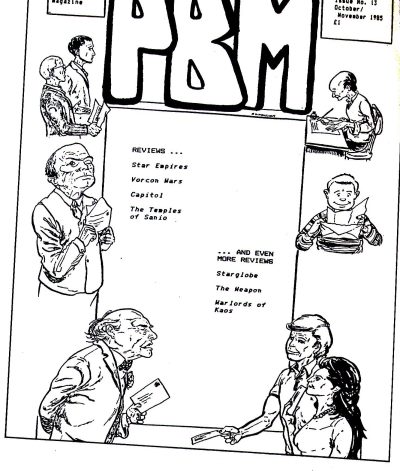

This month sees the start of a new column, put together by BRENDON KAVANAGH who has been involved in the Play By Mail gamesworld for some while. Brendon produces his own fanzine — THE TELEPATH — for players of the Play By Mail Game STARGLOBE, as well as contributing a regular column on STARGLOBE to PBM MAGAZINE. Take it away, Brendon...

The hobby of Play By Mail (PBM) gaming is now well established in the UK, and a lot has happened since Chris Harvey brought the PBMing bug across the Atlantic from America fifteen years ago. John Minson’s report on the first British PBM Convention in the April Issue set the scene: over the coming months I’ll be providing a regular update on the goings on in the PBM world, as well as looking at some of the games currently available.
To begin with, I’d like to explain the main elements of PBM gaming, and outline the basic structure of the games themselves.
A PBM game is a complex fantasy/strategy game played simultaneously by a large group of people who all use the postal system to interact with the game. To participate, each player sends orders for the current turn to the Game Moderator (GM), who is paid to process the orders and return the results to the players. Each player’s results are unique and personalised, and it is partly from studying these results that a player decides on the orders to pop in the post for the next turn.
Games may be human moderated, computer moderated or computer assisted. The way in which a game is moderated affects its feel, but shouldn’t affect the quality of the game itself. Players of the Fighting Fantasy type of game, for instance, tend to feel that computer moderation gives the imagination much more freedom. Conversely, space-based games generally lose out on atmosphere if the turn reports are handwritten sheets rather than computer-generated printouts.
Each moderating method has its inherent disadvantages. Human moderators — by their very nature — can have bad days, which are reflected in the standard of GMing. Computer software and hardware can suffer from disastrous bugs or system crashes that may wipe the entire game from memory. Backups are almost always taken regularly by GM’s running a computer system, but the hard disk equipment needed rapidly gets expensive... Generally, PBM games are run well, and problems are scarce.

PBM MAGAZINE, edited by Mike Costello and published every other month by EMJAY
PBM games either have fixed deadlines for orders or they are ‘open ended’. Where deadlines are enforced, players must post their orders on or before a certain date. The GM can then process all the orders at once, and the main overlying strategy in such games involves predicting the actions of enemies or opponents in order to outwit them. Deadlines are usually fortnightly, but other frequencies do crop up — weekly deadlines are set on some games to give fast turnaround, while three weekly or monthly deadlines in other games allow international players to participate without being affected by postal delays.
Open ended games have orders processed several times a week, and have no fixed way of ending. Players may submit orders as often or as rarely as they choose, and such games usually progress rapidly. Open ended games with a fast turnaround are likely to appeal to those who enjoy quick, realtime developments more than a staggered battle of wits.
Play By Mail games are characterised by the long lives they enjoy — games last for years, as a PBM game is no one-day campaign. A variety of methods are used to bring PBM games to a close. Normally, a game continues until there is a clear victor or the game becomes uneconomical for the Game Moderator to run. Alternatively, points or ratings systems may be employed in a variety of ways — some games end on a set date, when players are ranked according to achievements. One game involves a secret score, set by the GM at the start, and as soon as a player reaches that mystery score, then the game ends. In open ended games, a points system is used to identify the leading players.
Ultimately, games can be closed due to acts of God (computer failure or other real-life disaster), low popularity or even total boredom on the part of the Game Moderator. Fortunately, early closures are rare.
The most attractive feature of PBM games is probably the fact that they are multiplayer games. The results that arrive on your Turn Sheet after each move can be heavily influenced by the actions of other players. Operating alone in a game, with no allies to support you, can be very difficult as well as being a bit boring. It is very important to engage in diplomacy to get the most out of the game.
Inter-player communication, which take place outside the structure of the game itself as laid down by the Game Moderator, is termed Diplomacy, and involves direct contact between players by telephone or letter. Cunning Diplomats do well...
The art of Diplomacy involves a complicated process of bluff, double bluff and negotiation. The aim is to extract information from fellow players, to make alliances or enemies, to doublecross allies, and to indirectly manipulate other players. Diplomacy is also commonly used to plead for mercy from a superior force! Very complex relationships can develop between the players in a game, and the behind-the-scenes manoeuvering can often become as much fun, if not more fun, than the actual gameplay!
Following on from this brief introduction to the mechanics of PBM games, next month I’ll take a close look at a single game — VORCON WARS. This is perhaps the best introduction to PBM gaming around at the moment, and I’ll examine the game in depth for the benefit of readers thinking about taking up the hobby of playing games by mail. Meanwhile, please don’t hesitate to drop me a line at PBM MAILBOX, CRASH Towers — I’d like to include game tips and letters in a PBM MAILBOX FORUM, and it’s up to you to help out!